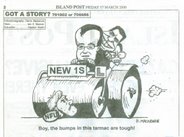Journalists on a junket
Along with Archie Campbell, Chair of Sustainable Development, we explained to the hand-picked and sceptical journalists how we had come to our decision and the implications for the islands – both good and bad.
This all happened in the “Community Room” at An Lanntair, which obviously doubles as a sauna.
To be fair, the RSPB were there to do a hatchet job on the application, and we were there to do a hatchet job on the RSPB. It was somewhat heated, but never, ever, rude or offensive.
One London journalist suggested that the Comhairle had already made up its mind behind the scenes before the vote on the planning application was taken. He was soon disabused of that notion, and his lack of knowledge of the Western Isles was quite staggering. However, he did acknowledge that, and was prepared to seek more information before announcing his ambivalence on wind farms.
I’ve searched in vain for any press reports since the journalists went home on Tuesday night, so it looks like they came away with no story.







1 comment:
Who are you trying to kid. I work as a planner and I know better than anybody (notwithstanding councillors themselves) that planning applications for wind farms or any other large scale development are generally decided long before they get to committee. Planning is not an impartial or objective process, it is riddled with value judgements and even abuses of power, and implying that councillors remained undecided on the issue right up until the day it was passed at committee is ludicrous. When we regard nature (e.g. the peatlands) as a commodity, it is economic value which determines whether the place is conserved or developed so no matter how compelling the argument against the development on environmental grounds, it still gets permission.
Much of the rhetoric supporting the wind farm rejects the intrinsic value of the peatlands - the value which is independent of its usefulness to humans. In assessing these value judgements, the Council gave greater weight to the economic rather than the environmental imperative. What is equally as perverse is that the relative importance of these values change depending on the context. I may be wrong on this but didn’t the Comhairle refuse an application (by the Scottish Seabird Centre in 2003) to put remote controlled cameras on St. Kilda because councillors decided that the plan was detrimental to the archipelago’s status as a World Heritage Site - blatant hypocrisy. However, I have no doubt that if there was potential for lolly and half a dozen jobs, councillors would also vote to plaster St. Kilda in turbines.
Planning is riddled with value judgements, which are in turn used to inform the intentions and beliefs of those deciding what is ‘good and right’, and vice versa for the island. Yes, it is difficult to make a decision on big applications such as this, especially in terms of the appropriate balance between the rights of the socially and economically excluded and the non-human world. However, suggesting the process is straight down the line does nothing more than to leave people assuming that councillors are even more dishonest and disingenuous than they initially thought. This is not just my opinion; it’s been proved time and time again in planning research. In fact, it is literally the first thing a planning student is taught in planning ethics.
Post a Comment